Inside the dramatic rescue of three men stuck in rising waters of Yorkshire cavern
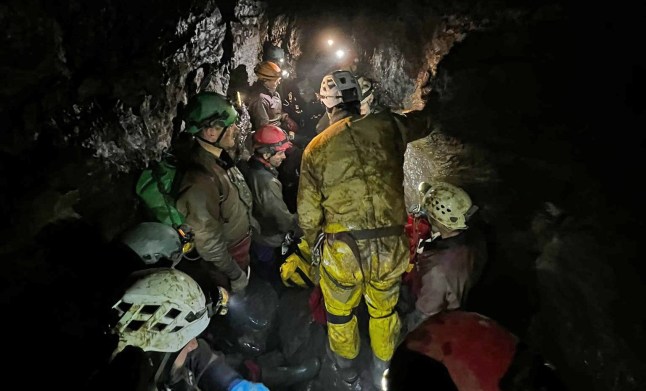

A few years ago, Derek Hammon spent nearly three hours crawling through a mile-long cave – it had always been on his bucket list.
One minute, the rescuer was in neck-deep water. Next, he was squirming through a tight chasm before looking down at a wide hole below his feet.
‘Normally, it’s a four to eight-hour trip,’ Derek, 59, told Metro. ‘Imagine going to the gym for eight hours – that’ll give you an idea of how knackering it is.’
But last week, Derek was helping to save three cavers who had become trapped inside the Dowber Gill Passage in North Yorkshire for 42 hours, all while Storm Amy raged above.
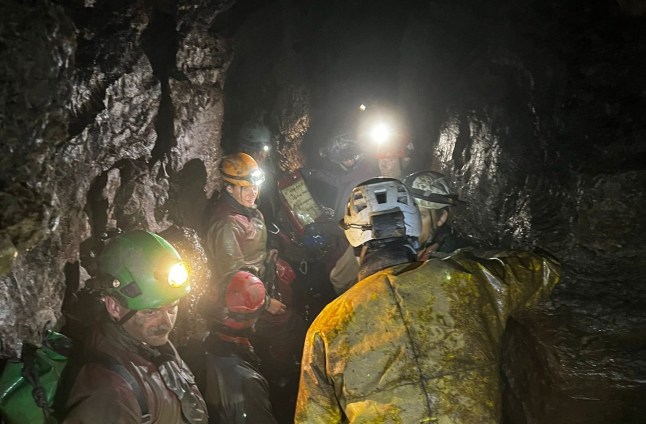
Sign up for all of the latest stories
Start your day informed with Metro’s News Updates newsletter or get Breaking News alerts the moment it happens.
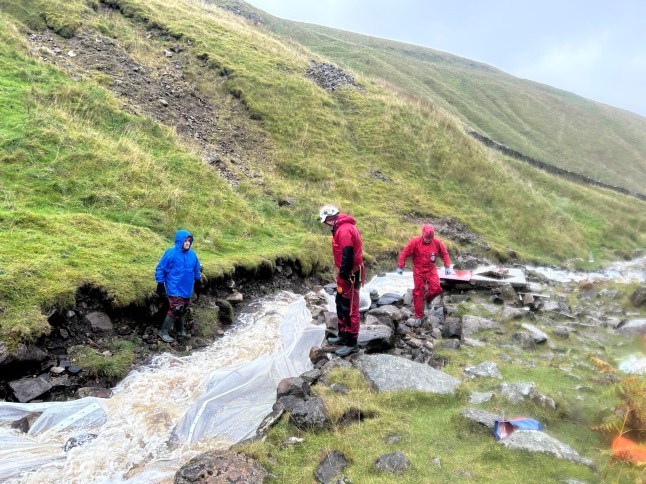
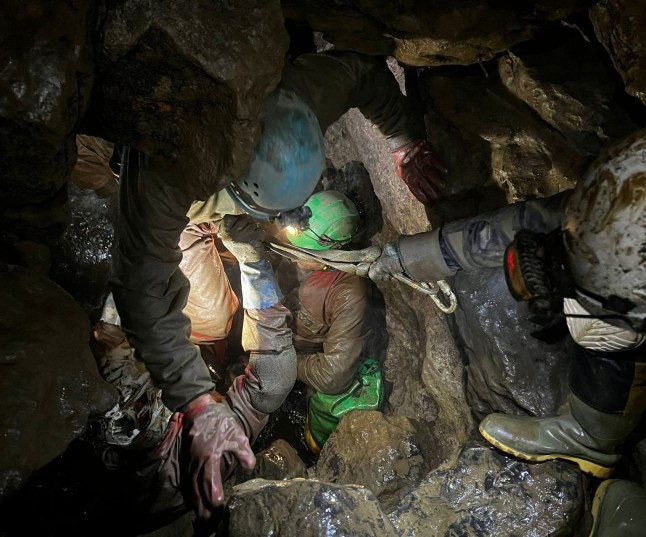
The Upper Wharfedale Fell Rescue Association (UWFRA), a rescue group in the Yorkshire Dales, said the 30-hour operation involved 100 volunteers.
UWFRA team leader Derek said the alarm was raised at 9.20pm on Thursday: ‘When they didn’t phone home when they said they would, one of their wives in North Wales told the police, “my husband’s not come back”‘.’
Volunteers found the men at around 2.30am on Friday, sitting below ledges near a 60-foot-deep rift by the Dow Cave end of the underground complex.
The cavers would have been in darkness, with only their LED torches to hand – if they didn’t switch them off to conserve their battery, however.
‘The biggest danger the men were in was suffering from hypothermia or exhaustion, which is how we found them,’ Derek said. ‘While they were stuck and struggling, they weren’t in any immediate danger.’
Storm Amy slammed into the UK on Friday, with heavy rain turning the streams into ‘torrents’ that sent floodwater into the warren of tunnels.
To view this video please enable JavaScript, and consider upgrading to a web
browser that
supports HTML5
video
‘The rescue was going hunky-dory until the water level started coming up,’ Derek said, with the weather, terrain and long hours pushing the rescuers.
‘There’s a section that’s very high-risk and narrow, where you’re lying on your side in a stream because it’s not wide enough for your hips. That floods even a few inches, and you’re in serious trouble.’
‘In some places, you’d be swimming. We searched through the cave to find it flooded, so we had to retreat.’
Teams of different rescuers rotated in and out every few hours to guide the exhausted cavers back, giving the men water and a self-heating Lancashire hotpot ready meal.
Traverse lines were jabbed between rocks, while a dam was fashioned out of plastic sheets to divert floodwater.
‘Bearing in mind, I made the calls for volunteers to come down at 12.30am,’ Derek added. ‘”Do you mind popping back to the Dales to help us out?” But they were more than willing to take their slippers off and come help.’
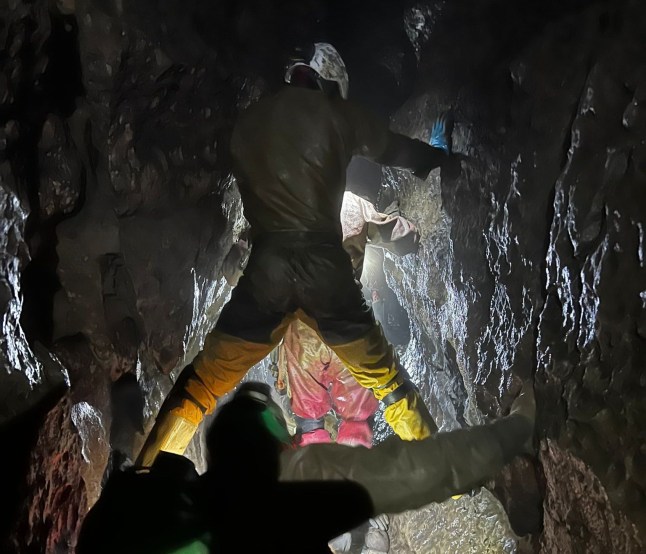
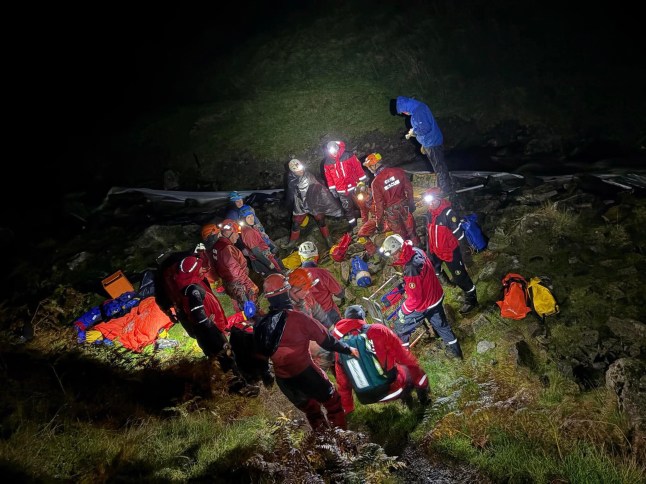
The first missing man was brought above ground at 3.30pm on Friday, the second at 2.30am on Saturday and the last caver two hours later.
‘One of their wives was staying at a hotel and we were sitting in a vehicle nearby drinking tea waiting for him to come down the hill,’ Derek said.
‘She said, “I’m going to bed for the night, here’s my phone number, give me a call when you get him, please”.
‘When he came down and they went to the hotel, he was able to mobilise himself quite happily. She was very grateful.
‘The last guy was absolutely exhausted and had to be put on a stretcher.
‘In that moment, I don’t think he cared what was going on. He wasn’t bothered; he was just very grateful, as was his wife.’
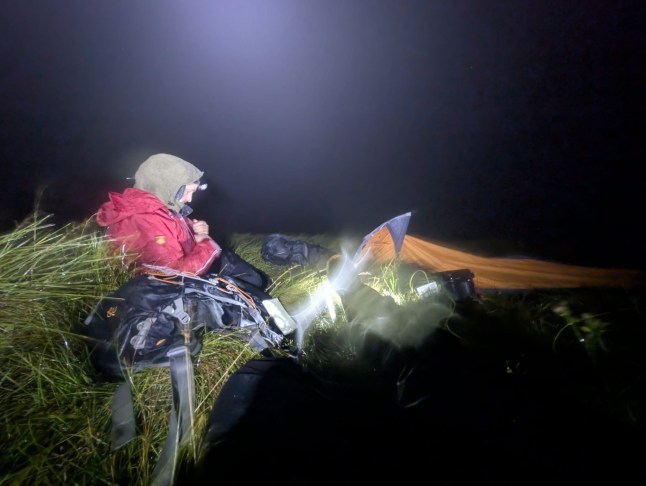
The mission was wrapped up at 7.45am – Derek said saving the men’s lives wouldn’t have been possible without the help of the volunteers.
‘The only people who were being paid for what they did were the two ambulance crews. Everybody else gave their time for free,’ Derek said.
Neighbouring caving teams involved included: Cave Rescue Organisation, Calder Valley Search & Rescue Team, Derbyshire Cave Rescue Organisation, Royal Air Force Mountain Rescue Service and the Swaledale Mountain Rescue Team.
A spokesperson for the North Yorkshire Police told Metro: ‘Our thanks go to the many search and rescue volunteers who carried out the long rescue operation in hazardous conditions.’
Caving, also known as spelunking, is a test of endurance, explained Derek, but the three ‘gents’ knew what they were doing.
Yet he said the family of the experienced cavers have been ‘trolled’ online for exploring during the storm, even though they set off the day before.
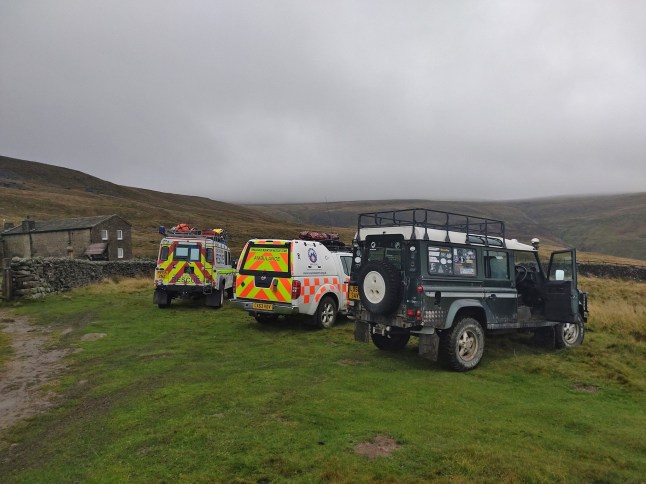
‘It was a perfectly reasonable trip for what they aimed to do,’ Derek added, which was to enter through Providence Pot and get to Dow Cave during a window of good weather.
‘I imagine they’ll still go caving again. “Maybe we got a bit tired on that one. Would we do it again?” But equally, they may go, “Let’s come back and have a successful trip”.’
The sport of caving began in Britain in the late 19th century, with the UK now home to 7,000 cavers and 140 caving clubs,’ Rostam Mamaghi, chair of the British Caving Association, the sport’s governing body, told Metro.
‘Caving in the UK is a pretty special experience, we have over 5,500 caves which altogether are over 1000km long,’ he added.
‘We have four distinct major caving regions: the Yorkshire Dales, Derbyshire, Mendip and South Wales. These have a mix of caves, some hundreds of thousands of years old, with delicate calcite formations.’
Derek, who has been with the UWFRA team for 23 years, hopes stories of cave rescues don’t put people off trying the sport.
‘It’s a challenge, even if it’s against yourself,’ he said. ‘For some, it’s science. How are caves formed?
‘For others, it’s exploration. We can map the stars and the oceans – the only way to map what’s underground is to go in a cave and see what’s around the corner.’
Get in touch with our news team by emailing us at webnews@metro.co.uk.
For more stories like this, check our news page.



